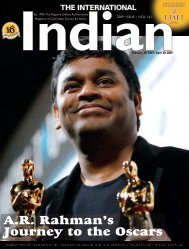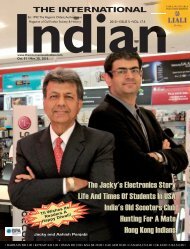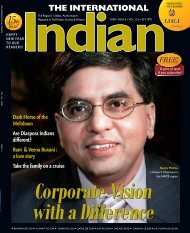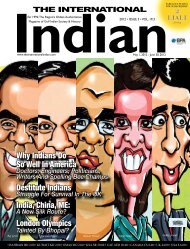THE BUSINESS OF EDUCATION - International Indian
THE BUSINESS OF EDUCATION - International Indian
THE BUSINESS OF EDUCATION - International Indian
Create successful ePaper yourself
Turn your PDF publications into a flip-book with our unique Google optimized e-Paper software.
[ <strong>BUSINESS</strong> <strong>OF</strong> MUSIC ]<br />
classical artists, specially the upcoming<br />
ones, says multi-percussionist and tabla<br />
player Bickram Ghosh. “These days you<br />
will hardly find new albums of classical<br />
artists and musicians. All that is being<br />
launched is basically old wine in a new<br />
bottle,” he added. This method of re-release<br />
has become the model of content creation in<br />
an industry that appears to no longer find<br />
viability in producing new content.<br />
The <strong>Indian</strong> classical music industry is<br />
stuck in a rut, and topmost on everybody’s<br />
blame list is the record label. “Where is the<br />
musical diversity that India is known for?<br />
When categories like classical music are<br />
relegated to the back of the store where five<br />
racks have become one rack, you know we<br />
have a problem,” says vocalist Anupana Sen,<br />
who has been trying in vain, to produce a<br />
cassette for more than three years inspite of<br />
her phenomenal success in various concerts<br />
both in <strong>Indian</strong> and overseas. “If young<br />
talent has been recorded, it is the offspring<br />
or disciples of the really big artistes,” she<br />
added painfully.<br />
Erstwhile champions of the category like<br />
Sa Re Ga Ma and Music Today are being held<br />
answerable for not sustaining their interest<br />
in the genre and repackaging their existing<br />
inventory. Sa Re Ga Ma admits it has not<br />
launched a single new artiste in the last five<br />
years in the classical genre. The spokesperson<br />
of Music Today, is defensive - if the entire<br />
music industry has slipped from Rs 1,200<br />
crore in 2002 to Rs 600 crore today, the share<br />
of classical music is no more than Rs 10 crore.<br />
“Sales in the classical music category have<br />
been stagnating. It has occupied 3.5 per cent of<br />
Planet M’s total business for the last two years,”<br />
informs its Public Relationship Officer.<br />
To put that in perspective, Hindi film<br />
music contributes to 50 per cent of Planet M’s<br />
business. At Rhythm House, a music store<br />
in Mumbai’s Kala Ghoda district, you will<br />
still find over 1,500 <strong>Indian</strong> classical titles,<br />
but Mehmood Curmally, the store’s director,<br />
says new releases at the store are down to<br />
less than 30 a year. “The others are all rehashed<br />
compilations,” he explains. “What’s<br />
happening is that more people are listening to<br />
more music but much of it is on the radio or<br />
on the mobile phone,” retorts Singh. Over the<br />
last 10 years most recording companies - Sony,<br />
Times Music and Venus - have ventured into,<br />
FIGURATIVELY SPEAKING<br />
Rs 1,150 crore<br />
The total size of the <strong>Indian</strong> music industry<br />
Rs 450 crore<br />
Losses due to piracy<br />
Rs 15 crore<br />
Money earned through ringtone downloads<br />
Rs 400 crore<br />
Organised market of film music in India<br />
Rs 100 crore<br />
Organised market for non-film music in India<br />
APPROXIMATE COST <strong>OF</strong> INVESTING IN A<br />
MUSIC ALBUM<br />
Total cost<br />
Anywhere between Rs 35-50 lakh<br />
Dubbing, mixing mastering<br />
Approximately Rs 12 lakh<br />
Cost per video<br />
Rs 10 lakh (usually the artiste does two<br />
videos)<br />
Cost of promoting the album (ad spots on<br />
radio and television, posters etc)<br />
Rs 15 lakh<br />
“<br />
Where is the<br />
musical diversity that<br />
India is known for?<br />
When categories like<br />
classical music are<br />
relegated to the back<br />
of the store where five<br />
racks have become<br />
one rack, you know we<br />
have a problem.<br />
”<br />
and exited, classical music. “Not every company<br />
has the understanding or the wherewithal to<br />
manage the category,” says Singh. It is not that<br />
there is no upcoming talent, so what is the<br />
reason for this newfound anathema.<br />
Some suggest the growing demand for<br />
other traditional music genres like spiritual<br />
music is another reason why record labels are<br />
losing interest in classical music. Spiritual<br />
music accounts for a fifth of Music Today’s<br />
top line. In addition, the new releases are<br />
not upto the mark, believes Chaiti Jacob, a<br />
music critic. “Last year there have been few<br />
releases that are being marketed as <strong>Indian</strong><br />
classical bands, which will do more harm than<br />
good,” she believes. “People are habituated<br />
in accepting classical music in a said format.<br />
If suddenly, it is changed, the acceptability<br />
will fall even further.” However, renowned<br />
slide-guitarist Debashish Bhattacharya,<br />
is unwilling to accept the theory of lack of<br />
acceptability. “How can record labels claim<br />
the genre is not profitable when concerts are<br />
packed every time?” he questioned. Actually,<br />
it doesn’t have the higher rate of return and<br />
that’s what dissuades then from investing, ”<br />
believes Gupta, whose company is all set to<br />
release atleast five new classical albums.<br />
Music on the Move<br />
The advent of new technology where you<br />
need not buy cassettes from stores but simply<br />
download even while travelling, has opened<br />
a new opportunity, but is also a threat to the<br />
existing notions of vending music. Palash<br />
Sen, lead singer of New Delhi-based group<br />
Euphoria, says, “Technology has advanced<br />
considerably and expanded the listeners’<br />
base, with people downloading music at a low<br />
cost. Music is easily heard on radio channels,<br />
music videos are shown on television and<br />
people are happily listening to innumerable<br />
songs on their MP3 players. However, this<br />
is precisely what has led to a considerable<br />
decrease in the sales of the music albums.”<br />
“Nobody,” says Sen, “wants to buy music<br />
cassettes or CDs any more because they’re<br />
happily downloading music off the Net.”<br />
Kirit Sengupta of <strong>Indian</strong> Music Industry<br />
(IMI) agrees, citing this as one of the prime<br />
reasons why the industry has bled profusely<br />
in the past few years. “Though many of our<br />
member companies have opened avenues<br />
for digital sales, it will take some time for<br />
others to catch up because the one time<br />
investment for such technology is still on<br />
the higher side,” adds Sengupta.<br />
Archisman Dinda is a freelance writer<br />
based in Kolkata.<br />
24<br />
<strong>THE</strong> INTERNATIONAL INDIAN
















